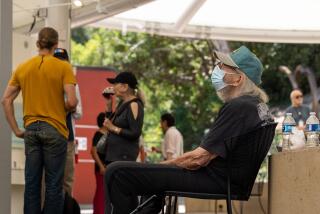Flu Bug’s Biting L.A. Kids Especially Hard
Children have been especially hard hit by an influenza virus that appears to be on the increase in Southern California, according to several local pediatricians.
The federal Centers for Disease Control reported last week that Type B influenza has been identified in California and 22 other states. In confirmed cases, 56% of sufferers were age 18 or younger, a CDC spokesman said. “Compared to previous years, there seems to be a lot morechildren with flu this year,” confirmed Dr. Susan Igdaloff, a North Hollywood pediatrician who has treated about 50 children for flu-like symptoms in the last two weeks.
Typically, children with the flu will run a fever of 102-104 degrees F. for four to six days, said Dr. William Singer, an Encino pediatrician and USC clinical professor of pediatrics. And the fever can come and go. In many flu patients, “there is fever for two or three days, then no fever, then two or three days of fever again,” Singer said. Also common are aches and pains, cough and sore throat. Vomiting and diarrhea are usually minimal, he noted.
“Parents often get hung up on the thermometer numbers,” Singer said, explaining that “fever is a protective mechanism and will disappear when the infection is over.”
To speed recovery, give children plenty of fluids and encourage bed rest or quiet play, Igdaloff advised.
Singer suggests giving acetaminophen for fever, not aspirin, which has been linked to Reye’s syndrome.
If a child seems really sick, if fever lasts more than three or four days, or if other potentially serious symptoms--such as a continual stiff neck--are present, seek medical attention, doctors say.
That Takeover Feeling
Your company’s just been acquired by a corporate giant. Or internal reorganization has sent your boss to another department.
Either scenario can leave a worker feeling as psychologically distressed as a jilted lover, said Michael Mercer, a Highland Park, Ill., industrial psychologist who specializes in working with such employees.
“When people ask me how employees feel during a takeover, I ask them to imagine how they would feel if their lover or spouse had an affair and left them,” Mercer said. “That is how people feel during a friendly takeover.” During an unfriendly takeover, he added, workers can feel much worse.
Panic and a crisis mentality are other common psychological side effects, he finds. “From a psychological point of view, mergers and reorganizations are similar,” he said. “People feel flabbergasted. With breathtaking speed, their jobs, finances, identities, careers and life styles go up for grabs.”
Uncertainty is almost universal among workers in merged or reorganized firms, added Mitchell Marks, a Los Angeles organizational psychologist. “The common first reaction is, ‘Will I survive?’ ” He tells employees that it’s natural and OK to worry. After the initial shock wears off, he added, “People may leave physically. Or they may leave psychologically.”
Action can quell anxiety, Mercer and Marks agreed. “Realize the rumor mill is the ‘worst-case scenario,’ and don’t rely on it for all your information,” Marks advised. “Collect data on your own.” In a merger situation, talk to people who work for the other company, he said. “Make an appointment to meet your new boss. Don’t assume the new boss knows anything accurate about you.”
“The first rule is to take care of yourself,” Mercer said. “Put out feelers for new jobs. Past performance may not mean that much. But meanwhile, act like a team player.” And don’t bury your sense of humor, he added. “Humor and jokes are good ways to relieve anxiety.” Among his favorites: “If my boss calls, would you get his name?”
Antibiotic Antipathy
Due to inconvenience, cost or side effects such as abdominal cramping, many patients don’t take the full course of antibiotics often prescribed for such ailments as ear or urinary tract infections, finds Ed Thompson, a Los Angeles pharmacist.
“Much research has focused on which antibiotic to use and how long to use each one,” he said. “For patients to decide on their own that they don’t need (the medicine) anymore is folly.”
“It’s important you take the full course of therapy to be sure you’ve cleared away all the infection,” added Cynthia Hespe, vice president of education for the California Pharmacists Assn. in Sacramento. “Even though you feel better, the infection may not be gone entirely.”
Other advice about antibiotics: If it’s prescribed to be taken on an empty stomach, “that means one hour before or two hours after a meal,” Thompson said. Take medicine at intervals prescribed, Hespe added. “Three a day means three a day.”
More to Read
Sign up for Essential California
The most important California stories and recommendations in your inbox every morning.
You may occasionally receive promotional content from the Los Angeles Times.










![[20060326 (LA/A20) -- STATING THE CASE: Marchers organized by unions, religious organizations and immigrants rights groups carry signs and chant in downtown L.A. "People are really upset that all the work they do, everything that they give to this nation, is ignored," said Angelica Salas of the Coalition of Humane Immigrant Rights. -- PHOTOGRAPHER: Photographs by Gina Ferazzi The Los Angeles Times] *** [Ferazzi, Gina -- - 109170.ME.0325.rights.12.GMF- Gina Ferazzi/Los Angeles Times - Thousands of protesters march to city hall in downtown Los Angeles Saturday, March 25, 2006. They are protesting against House-passed HR 4437, an anti-immigration bill that opponents say will criminalize millions of immigrant families and anyone who comes into contact with them.]](https://ca-times.brightspotcdn.com/dims4/default/34f403d/2147483647/strip/true/crop/1983x1322+109+0/resize/840x560!/quality/75/?url=https%3A%2F%2Fcalifornia-times-brightspot.s3.amazonaws.com%2Fzbk%2Fdamlat_images%2FLA%2FLA_PHOTO_ARCHIVE%2FSDOCS%2854%29%2Fkx3lslnc.JPG)